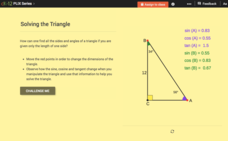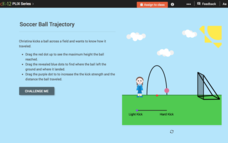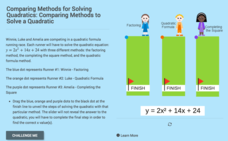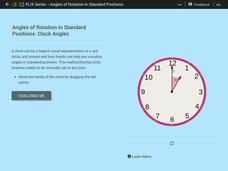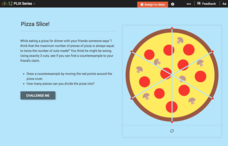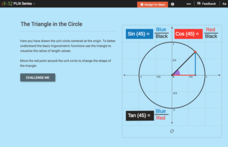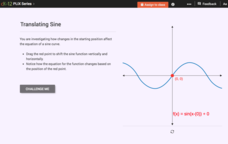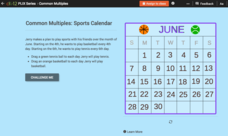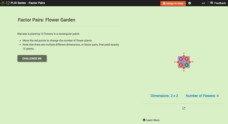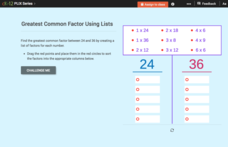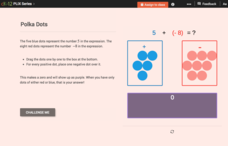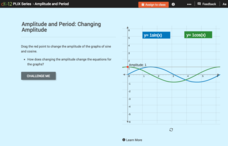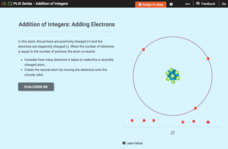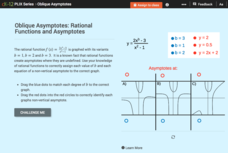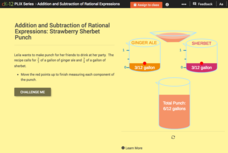CK-12 Foundation
Pythagorean Theorem for Solving Right Triangles: Solving the Triangle
Observe the change in the trigonometric ratios as angles vary. An interactive provides the values of trigonometric ratios for both acute angles in a right triangle. Pupils create a right triangle to match given criteria and find the...
CK-12 Foundation
Angles of Elevation and Depression: Fly-By Calibration
Determine the distance between two trees from afar. Pupils use an interactive resource to create two right triangles using trees and a plane. They determine the horizontal legs of each triangle to find the distance between the two trees.
CK-12 Foundation
Right Triangles, Bearings, and Other Applications: Sailing Race
Help your class get their bearings when it comes to right triangles. Pupils determine distances traveled or components given the bearing of a sailboat using an interactive. The scholars develop a sense of finding the bearings of a given...
CK-12 Foundation
Quadratic Functions and Their Graphs: Soccer Ball Trajectory
Determine critical points in the flight of a soccer ball. Pupils use an interactive resource to find the vertex and x-intercepts of the graph of the trajectory of a soccer ball after being kicked. Scholars investigate the trajectory...
CK-12 Foundation
Comparing Methods for Solving Quadratics: Comparing Methods to Solve a Quadratic
Determine the quickest process for solving quadratics. Pupils compare the number of steps in the process of solving quadratics using three different methods. Scholars determine which situations lend themselves to the different solving...
CK-12 Foundation
Angles of Rotation in Standards Positions: Clock Angles
Use a clock face to develop angles representing standard position angles. The interactive allows pupils to create angles using the hands of a clock. Scholars discover that there is a difference in the angle formed using a clock face and...
CK-12 Foundation
Using Quadratic Equations to Solve Problems: Pizza Slice!
Get the most out of a pizza. Class members use an interactive to simulate cutting a pizza to determine the maximum number of slices possible. The pupils create a set of data points and determine the equation that models the relationship.
CK-12 Foundation
Trigonometric Functions and Angles of Rotation: The Triangle in the Circle
Go around the unit circle and create triangles. Pupils move a point around the unit circles to visualize the triangle associated with the angle in standard position. The three main trigonometric functions are defined in terms of the legs...
CK-12 Foundation
Reference Angles and Angles in the Unit Circle: Exploring Reference Angles
A steal of a deal — get four angles for the value of one. An interactive resource allows individuals to visualize all four angles that have the same reference angle. Pupils answer questions by using the interactive to create the...
CK-12 Foundation
Translating Sine and Cosine Functions: Translating Sine
Learn how to slide sine back and forth and up and down. Pupils move the starting point of a graph of sine vertically and horizontally. They investigate the changes to the equation of the graph in relationship to the translation. They...
CK-12 Foundation
Sums of Integers with Different Signs: Board Game
Five questions challenge scholars to show what they know about integers. Using an interactive board game, learners move pieces to discover where a player landed, then answer problems involving both positive and negative integers.
CK-12 Foundation
Common Multiples: Sports Calendar
Using a calendar, basketballs, and tennis balls, young mathematicians determine the common multiples of four and six. Individuals drag and drop the balls onto the correct dates each sport will be played, allowing them to see which days...
CK-12 Foundation
Factor Pairs: Flower Garden
Arrange the dimensions of Marissa's rectangular flower garden so that 12 flowers can be grown. How many factor pairs does the number 12 have? What dimensions are necessary for a square shaped planter?
CK-12 Foundation
Greatest Common Factor Using Lists
By creating a list of factors for two numbers, it is easier to see the greatest common factor. Each question in an interactive resource asks pupils to identify the greatest common factor for the numbers 24 and 36 in several different...
CK-12 Foundation
Addition of Integers: Polka Dots
What happens when you add negative and positive integers to one another? Do you add or subtract, and will the answer be positive or negative? Young mathematicians use blue and red polka dots to determine the value of an expression that...
CK-12 Foundation
Sine Graph and Cosine Graph: Changing Amplitude
Scholars manipulate the amplitude of the graphs of sine and cosine, notice how the change in amplitude is reflected in their graphs, and answer several questions about the concept they noticed.
CK-12 Foundation
Whole Number Subtraction: Penguins Go for a Swim
As penguins jump off of an iceberg, young mathematicians count the remaining penguins in order to discover the whole number subtraction answer. As they work through the questions, they can manipulate the red dot to add and subtract more...
CK-12 Foundation
Addition of Integers: Adding Electrons
Young mathematical scientists interact with protons and electrons in an atom to create a neutrally charged atom. They answer questions based on their findings throughout the interactive resource.
CK-12 Foundation
Oblique Asymptotes: Rational Functions and Asymptotes
Examine the connection between rational functions and their graphs. Individuals use an online manipulative to sort equations with horizontal and oblique asymptotes. They focus on the degree of the numerator and denominator.
CK-12 Foundation
Horizontal and Vertical Asymptotes: Rational Functions
Play with the graph of a rational function to discover the asymptote patterns. Young scholars use the interactive lesson to discover the relationship between the asymptotes and the function. As they manipulate the function, the graph...
CK-12 Foundation
Zero, Negative, and Fractional Exponents: Patterns with Powers
Build a foundational understanding of exponent patterns. Young scholars manipulate the bases of exponent expressions. They discover the meaning of negative exponents through their exploration.
CK-12 Foundation
Direct Variation: Value of a Painting
Help your pupils find a pattern of direct variation. Young scholars use input-output pairs to find a constant of variation and then write the equation. As they build their equations, the interactive lesson provides feedback.
CK-12 Foundation
Addition and Subtraction of Rational Expressions: Strawberry Sherbet Punch
Explore the connection between fractions and rational expressions. Young scholars manipulate fractions with unlike denominators to find a total. Challenge questions allow them to check their work to ensure they are correct.
CK-12 Foundation
Division of Rational Expressions: Step by Step
Division just got a little trickier! An interactive lesson highlights the steps of dividing two rational expressions. Young scholars determine the order of the steps from a bank of possible work.
Other popular searches
- Self Assessment Tools
- Music Assessment Tools
- Assessment Tools for Science
- Assessment Tools Coins
- Assessment Tools for Math
- Assessment Tools for Music
- Assessment Tools Singing
- Assessment Tools Lesson Plan
- Self Assessment Tools
- Assessment Tools + Coins


